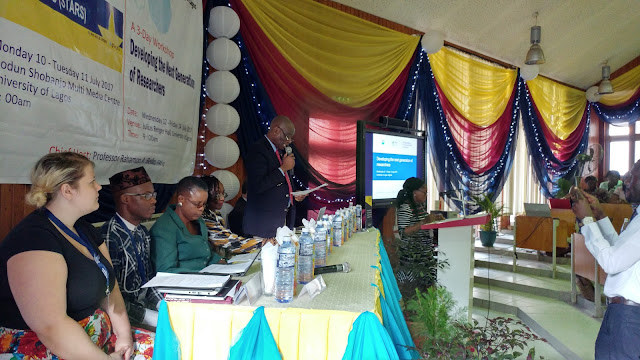By Verity Buckley - CIRCLE Programme Officer
In July 2017, I attended the ACUs Developing the Next Generation of Researchers workshop. Hosted by the University of Lagos, the workshop explored innovative approaches to academic mentoring and career development for emerging researchers. I was not only looking forward to the content of the event, but also the opportunity to meet with some of the CIRCLE Visiting Fellows (CVFs) who were helping to facilitate the programme. Eight CVFs were scheduled to deliver sessions on areas such as mentoring, research cooperation, professional development and the role of the researcher in a global research environment. The CVFs were well suited to deliver these sessions, having made substantial achievements and progress in their careers since completing their CIRCLE fellowship, despite facing a number of challenges.
In July 2017, I attended the ACUs Developing the Next Generation of Researchers workshop. Hosted by the University of Lagos, the workshop explored innovative approaches to academic mentoring and career development for emerging researchers. I was not only looking forward to the content of the event, but also the opportunity to meet with some of the CIRCLE Visiting Fellows (CVFs) who were helping to facilitate the programme. Eight CVFs were scheduled to deliver sessions on areas such as mentoring, research cooperation, professional development and the role of the researcher in a global research environment. The CVFs were well suited to deliver these sessions, having made substantial achievements and progress in their careers since completing their CIRCLE fellowship, despite facing a number of challenges.
Researchers face a range of
obstacles throughout their careers, particularly during the early stages. The
importance of immediately taking responsibility for one’s own development was highlighted
throughout the workshop – solely relying on an institution to provide
opportunities can be risky and participants were encouraged to look for other
ways of building their experience. Their contribution to the wider “research
effort” was discussed, as well as the importance of considering the impact that
research can have on local and global issues. It was stressed that researchers
must view themselves as part of a wider international research movement.
The establishment of a Professional
Development Plan (PDP) can be a critical step in continuous professional
development. Commitment to an action plan helps the researcher to progress, and
the creation of milestones and goals can help them to keep track of their
progress. As well as advice on attitudes and personal development, the use of constructive
tools and approaches to the PDP were explored, including the importance of
writing SMART (Specific, Measurable, Achievable, Realistic, Timebound)
objectives and finding ways of providing evidence to demonstrate progress.
 |
| Prof. Ogundipe, Deputy Vice-Chancellor (Academics & Research) addressing participants |
Many academics ultimately strive to become effective researchers and global leaders in their field. During the workshop, participants proposed and discussed various tactics that would help the researcher towards professional leadership. These included research uptake, mobile research and utilisation of technology and communication for networking and dissemination, as well as the importance of learning from role models within the workplace and wider academic fields. Role models can come in many forms, but within the academic research environment these are most likely to appear in the form of mentors. Researchers may find that they take on the role as mentor, as well as mentee. During the workshop, the CVFs offered personal anecdotes on their experiences as mentors, as well as professional tips and advice. Utilising the experiences of mentors could be critical in planning career development within an institution. Senior members of staff and personal managers could potentially give advice and support to their mentees, providing important guidance in seeking promotion or research opportunities.
 |
| CIRCLE Fellow Catherine Nnamani delivers a session |
Nevertheless, finding time for development opportunities amidst a heavy workload within a research department can be difficult, especially for those who take on more administrative and teaching responsibilities at growing or overstretched institutions. The CVFs had ample experience as both mentees and mentors, and facilitated excellent discussions. The various debates that arose during the workshops were very thought provoking, but specific issues were highlighted as being particularly acute in Nigeria such as the lack of international networks and opportunities for collaboration and the growth of younger institutions struggling to build the capacity of their overstretched members of staff. Each participant had their own unique experience to contribute, and their innovative ways of overcoming their obstacles were inspirational for all that attended.
After an intensive 3 days, the
workshop drew to a close. Not only had the participants developed tools to
further establish their academic careers, but they had managed to create
networks and potential routes through to future collaboration. As the participants
filed out of the lecture hall, the atmosphere was bubbling over with
anticipation (and not only due to the tea and biscuits that were waiting
outside).

No comments:
Post a Comment